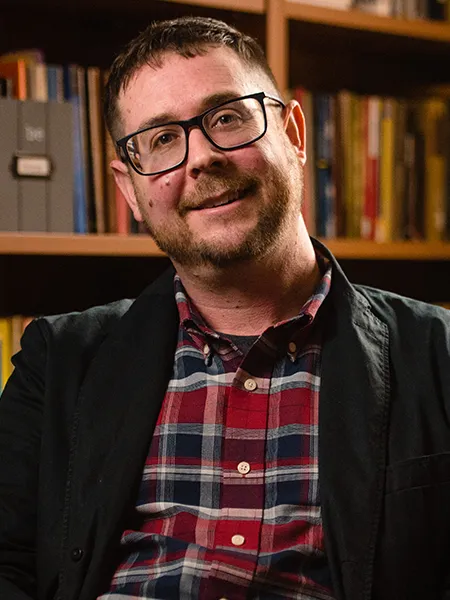
Matthew Vetter
For Matthew Vetter, reading and writing are about more than the words on the page. They’re about the impact those words have on our lives and our world. He shares that passion with his students every day as a faculty member in the Department of Language, Literature, and Writing. Learn more about him in this week’s Meet Our Faculty feature.
What is it about the English field that initially drew you in—and ultimately keeps you interested?
Honestly, it’s the way English lets you dive into everything—stories, technology, ideas, ideology, all of the ways we as people make meaning out of the chaos of life. What hooked me early on was the chance to explore how language shapes the world around us, and that’s still what keeps me going. For me it was always about writing, but reading drove that passion.
These days, I’m especially fascinated by how platforms like Wikipedia and Large Language Models trained on Wikipedia are reshaping knowledge and communication. English, in all its forms, has this endless toolkit for unpacking how we understand each other, and there’s always something new to explore.
Why do you enjoy teaching in this discipline?
Teaching in English is awesome, because it’s so versatile. Since joining IUP, I’ve had the chance to teach 14 unique courses! I get to help students make meaning, whether they’re doing research, interacting with AI, or figuring out how to tell their own stories through creative genres like poetry and creative nonfiction.
I love witnessing that “aha!” moment when they realize they’re not just learning about language—they’re using it to make an impact. They, and all of us, are the authors of our lives. Plus, it’s fun to show them that writing, which they might take for granted, is full of opportunities for critical thinking and creativity.
What advice would you give students about how to succeed in college?
Success in college isn’t about getting good grades (and all of us need to find new ways to focus way less on this). It’s about engaging with the material, asking questions, and seeking opportunities to grow intellectually and personally.
I’d advise students to embrace collaboration—whether that’s through group projects, peer reviews, or simply sharing ideas in class. That’s the best way to learn. Additionally, don’t be afraid to challenge established knowledge or authority figures, especially in the current political climate, but do so thoughtfully and respectfully. And finally, take advantage of your professors’ experience and training. Get to know them during their office hours, send them an email, or stay after class to chat more about what you’re learning.
Tell us something most of your students may not know about you.
Here’s one: I’m kind of a nerd about Wikipedia. (OK, my students probably figure that out pretty quickly!) But they might not know how much I love stepping away from the digital world every now and then. Whether it’s cooking, road trips, traveling overseas, or just spending time outdoors, I’ve found that those moments are where I do my best thinking.
Oh, and I’ve got a pretty eclectic taste in music—I’m always up for discovering a new artist and seeing a concert. Lately, I’ve been listening to Kendrick Lamar’s 2024 album GNX and the country rock band Wednesday.